| |
|
|
|
Cornelius (Neil) Haggerty
U.S. Navy
 |
| Born: 1921 |
Residence:
San Jose, CA
United States |
Original home:
Los Angeles, CA
United States |
THE DAY THE JAPANESE SURRENDED
Early this morning, August 15th, now known as VJ day or peace with Japan, we flew six of our Navy planes from Maui to Ford Island in Pearl Harbor. The planes were lifted from the runway to the flight deck of the U.S.S. Enterprise. We removed our clothing from the deck and took them to our new room on the ship.
My roommate and I decided to play nine holes of golf. We stopped at the bar to have a beer after nine holes of golf. The bartender was very excited and told us that Japan had surrendered. We were overjoyed because the Enterprise was leaving the next morning for the Invasion of Japan. Our estimated loses of crewmen based on our experience on Okinawa of 30% loses would be in the 50% range.
I would no longer have to go through their personal effects of my fellow pilots, nor assist the captain in writing the letter in explaining the deaths of my Crewmen of VB-14 to their wives and family.
We were both very thrilled that we would not have to invade Japan. This meant that I would be able to go home to my lovely wife and to hold first child, little Theresa, who was six months old, in my arms.
Neil Haggerty
|
|
Robert Hahn
|
|
Louis Hallman
|
|
Dorothea Hansen
|
|
Emanuel Harding
|
|
Richard A. Hardy
Civilian
| Born: 1933 |
Residence:
San Diego, CA
United States |
Original home:
Sanford, ME
United States |
I was 12 years old, and my father had been classified 1A for the draft and expected to be called any day. He told me that I would have to help my mother at home and to be much nicer to my younger brother. My uncle, Dad's younger brother, although married and with three children, had been drafted or enlisted a year or so earlier, had been wounded at Le Harve, France, and was recovering. Dad was working as a rigger at the time building Liberty Ships at the South Portland, Maine shipyard.
I don't recall if I heard it first on the radio, but suddenly everyone was shouting that Japan had surrendered unconditionally and the war was over! It was just pure happiness and exhilaration everywhere! I remember that I did not know if I was so happy because my Dad did not have to go to war, or that no more of my neighbor's would be killed. Perhaps it was simply that the unbounded joy, happiness, relief, and freedom that enveloped the adults was transmitted from them to me. We were all one at that point.
I left my house and walked to the town square, and it seemed the entire 18,000 population of Sanford, Maine had done the same. I have never witnessed such pure joy before or since. There were no strangers, everyone knew that we had all endured and fought the war together, and we had won together.
|
|
Sylvia Harris
War bride (United Kingdom)
Original home:
United Kingdom |
I was on a tram going back across the water to my Grandma's and I heard all kinds of murmers and buzzing and I finally asked someone what was going on and she told me the war was over!
As my husband, Jack Harris, was still in the army at Kennedy general Hospital, the first thing that came to my mind was that he would not have to go to the C.B.I. Theatre as that had been the rumour. You can imagine how relieved I was about that!
Submitted by:
Linda A. Laurie
Poway, CA - United States
Relationship to Storyteller:
Adult volunteer
|
|
Juanita Harris
Office worker in an essential industry
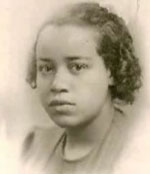 |
| Juanita before the war. |
Residence:
Santa Clara, CA
United States |
Original home:
United States |
My husband Stan and I had just arrived in Tuskegee, Alabama. The war in Europe was over, but Stan, a pilot, had not been separated from the Army Air Force yet. I had graduated from the University of Minnesota in May and was hoping to get a job at the Tuskegee Institute.
Stan and I had gotten married on August 7th, bought a car and drove off to the South. The one thing that I remember the most was how well we were treated. Stan was a Captain. Everywhere we went, people saluted him and asked about his time in the service.
I remember feeling no joy on August 14 - just relief that the war was finally over. I remembered the cousin that had gotten killed on D-Day; and all of the friends I had gradated from high school with who would never return. I was thankful that the War was over and that perhaps we could return to some form of normalcy.
The War has left its mark on all of us. Friends and relatives lost. We shall never forget them. We speculate on what they could have become. And in the end, our servicemen were called "The Greatest Generation". I can add nothing more to that.
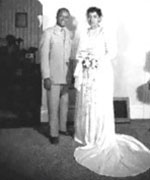 |
|
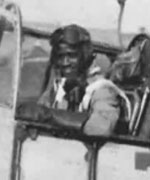 |
| Juanita and her husband Stan, August 7, 1945. |
|
Juanita's husband Stan, a Tuskegee Airman, in the cockpit of his P-51 fighter plane. |
Submitted by:
Warren C. Hegg
Los Gatos, CA - United States
Relationship to Storyteller:
Adult volunteer
|
|
Lewis Haus
|
|
Dave Heagerty
U.S. Army
| Born: 1928 |
Residence:
San Joe, CA
United States |
Original home:
Alameda, CA
United States |
I learned of the end of World War II, on August 14th, 1945, while in the shower after football practice at what then was known as San Francisco JC on Ocean Avenue, SF.
It was close to 5 o’clock on a Thursday afternoon. The Japanese surrender did not come as a surprise. In fact we expected the Japanese war lords would have capitulated between the dropping of the two atomic bombs, Hiroshima (August 6th) and Nagasaki (August 9th).
We got out of our shower, quickly dressed and hurried to catch a “K” Line street car that would normally drop us off at First and Market Street for a block’s walk down First Street to Mission Street and the East Bay Terminal. An “A” train ride across the bay to Havenscourt Blvd in Oakland would bring me to within three blocks of home.
Celebrating the war’s end quickly and wildly got underway on Market Street in Downtown San Francisco, so Market Street car lines were directed to Mission Street.
I was 17 at the time and a recent High School Graduate. I had already enlisted in an Army Special Training Program/Enlisted Reserve Corps on July 24th and was awaiting orders to attend fall classes in uniform at the University of Utah in Salt Lake City. Classes would start in early September.
After a quick dinner at home I would join my parents for a ride downtown to participate in a spontaneous celebration of the war’s end that would take place at Oakland’s 14th and Broadway.
It not only marked the end of a costly and destructive war that killed 60 million world wide, including a quarter million Americans, but it also ended one of the greatest eras of unified community spirit and civilians pulling together in our nation’s history.
While the use of atomic bombs has spurred endless controversy ever since, it did end hostilities, which if allowed to continue probably saved another two million lives, both American and Japanese and perhaps even my own.
Submitted by:
Warren C. Hegg
Los Gatos, CA - United States
Relationship to Storyteller:
Adult volunteer
|
|
Irene Hegg
(Maiden Name: Irving)
Factory worker in an essential industry
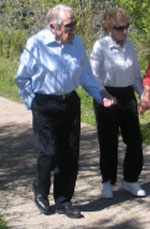 |
| Born: 1920 |
Residence:
Boise, ID
United States |
Original home:
Aberdeen, WA
United States |
On August 14, 1945, I was living on 6th Street in Aberdeen, Washington, with my sister, Peggy, in the house that our parents had left us.
Both our husbands were in the service. Peggy's husband, Chuck Fradenburg, was serving in Germany, and Sterling, my husband was in the Pacifiic, serving in the US Coast Guard. I hadn't seen Sterling for 16 months. Our first chid, Stanley, was only 3 months old when his father enlisted. I still remember standing there with my baby in my arms, both of us crying our eyes out, watching him disappear over the hill to board the bus that was to take him to California to report to duty.
All the time he was away, he wrote home faithfully and often wrote about having more children. He also sent us some pictures (my favorite is of him sitting on a cot reading the Stars and Stripes -- he later became a newspaperman himself.)
During the early part of the war, I had worked the night shift as a "Rosie" at the Boeing Aircraft Plant in Aberdeen inspecting fusillage rings for the bombers that were being built there. I remember how our supervisors kept stressing how important it was that our boys had failure proof equipment to fly them as safely as possible to and from their targets.
Later on, someone at the local school administration asked me to help teach at the local elementary school, since there was such a shortage of teachers. There was a lot of upheaval in the schools at the time, because of the way the war had disrupted the lives of so many. (The teacher who I replaced had a mental breakdown in front of her students when she learned that her son had been killed.) I discovered that I had a talent for working with children who were bright but emotionally distraught, a career a pursued many years later.
I can't remember the exact time of the day when we learned that Japan had surrendered, but I do remember Peggy and I leaning forward listening to the announcement on the radio. We couldn't believe that the war was finally over. We were so happy that it meant that our husbands would soon be coming home. Stanley would see his father again and our family would be reunited at last.
Before Sterling arrived home, I had a terrible shock when I was visited by the minister of our church who came to tell me that Sterling's father had received a telegram from the War Department notifying him that his son had been killed in combat.
At first, I was staggered by this news, but the more that he talked to me, I realized that the minister had confused Sterling with his younger brother, Royce, who had joined the Army only a few months earlier as soon as he graduated from high school. It was Royce who had been killed on Okinawa.
My heart ached with conflicting feelings to be so relieved that it was Royce, and not my husband, who had lost his life.
When Sterling finally arrived at our front door, I was so excited, laughing and crying at the same time, that I couldn't open the screen door to let him in! I could hardly recognize him. He had lost so much weight and was sunburned a deep brown!
I remember feeling a sense of guilt that my loved one was home, safe and unharmed when so many other had lost their lives or were forever scarred by the horrors of war. Now that we are in the twilight of our lives, Sterling and I have an even deeper appreciation of how we were the lucky ones, who went on to have the joys of family, homes and careers. It is so important that people never forget how much was paid by those who gave their all for our country.
Submitted by:
Warren C. Hegg
Los Gatos, CA - United States
Relationship to Storyteller:
Son/Daughter
|
|
Ed Henschel
Other (U.S Navy Reserve)
How many letters?
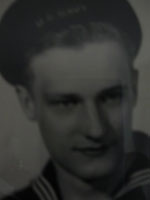 |
| Born: 1925 |
Residence:
San Jose, CA
United States |
Original home:
Chicago, IL
United States |
What do I remember about VJ Day or August 14, 1945 and the end of WW II? It is very difficult to remember after so many years have passed. That was 64 years ago and I can hardly remember yesterday!
I was an aviation radioman stationed at Kaneohe, Hawaii. Our radio shack served about 20 stations. Remember back then it was Morse code, not cell phones, not regular phones, and radio did not reach very far. Dot dash was the name of the game. I believe I was sleeping when word was received about the Japanese surrender. I was assigned to the mid watch or third shift. Upon hearing the news, my thoughts immediately shifted to “what do I do next?”
I was very lonesome for my family in Chicago and very, very lonesome for my one and only love in my life! She was very gorgeous and sharp young lady I met in Tillamook, Oregon when I was a member for ZP33. This Squadron consisted of LTA Blimps, or (Lighter Than Air Blimps).
The western coastline of the United States was patrolled by these blimps from San Diego, Moffat Field, Tillamook and Quileute, Washington. They would escort crippled ships to the repair docks in Washington and California while constantly on the lookout for enemy submarines.
I left for Hawaii November of 1944 and by November of 1945 I had received approximately 365 letters from my girlfriend and she had been sent approximately 365 letters from my girlfriend and she had been sent approximately 365 letters from me! At that time she was living in Campbell, California.
Was I worried about the economy or anything like that? NO WAY! I was 20 years old and my thoughts were about ME and my girlfriend! I was discharged from the Navy December 4, 1945, married on the 16th of December and left for Chicago on the 20th of December, 1945 to introduce my new bride to my family. That explains what I was thinking during that day that ended WW II.
By E.E. Henschel
Submitted by:
Cuong K. Le
San Jose, CA - United States
Relationship to Storyteller:
Youth volunteer
|
|
Rudolf Hirt
|
|
Martha Hoffman
|
|
George Hoover
U.S. Army Air Corps
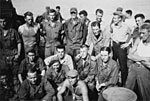 |
| Born: 1924 |
Residence:
Chula Vista, CA
United States |
Original home:
Aurora, IL
United States |
On August 14, 1945. I was on board the USS Brazil in the Mediterranean Sea. We had left LeHavre, France, on our way to the China Burma India Theater. The 425th Night Fighter Squadron had orders to go there.
We heard the News when our Master Sergeant came running thru the crowd on deck who were just laying around getting some Sunshine.
He was yelling, "Our orders have been changed to go to New York!"
We thought it was a prank, but one of the Officers was right behind him and said they had received the news by radio. Him we believed.
One word to describe my feelings of that day? HAPPY.
We had been in England, France and Germany flying our missions with The P-61 Black Widow, an airplane equipped with Radar for night flying missions and were ready for some different scenery.
Then orders came through that we were to go to March Field, Riverside, CA. About six days later we arrived at Pier 19 in New York. As we sailed into the harbor everyone ran to the railing to see the sight. We were warned that the ship might capsize if too many were on one side.
From Pier 19 we were trucked over to Fort Myers where they changed our orders again. Due to the Point System being used at the time, we received a 30 day furlough.
|
|
Evelyn Houser
|
|
Murray Hunt
U.S. Army Air Corps
| Born: 1919 |
Residence:
Redwood City, CA
United States |
Original home:
Berkeley`, CA
United States |
There was little enemy aerial resistance in the last months of the war, so we, as Aircraft Armorers had little to do. In August 1945, when the War was officially over, I had signed up to go to American University, being held in Biarritz, France. Our appreciative country started this program for their servicemen to help them get started on a new life. I chose this because I did not have enough points to be eligible to return home. The point system was installed for those men who had served the longest in battle areas overseas. I learned that I had enough points for a trip home sometime in September.
Earlier, we had been kept very busy when we were in France, and especially in Italy, the previous summer, when our 86th Fighter Group flew four missions a day. Our air field in Germany was built by the US Corps of Engineers.
I was sent to Italy in July 1944 and assigned to the 86th Fighter Group which had taken over the airfield at Grossetto, north of Rome. Later, after the 92nd Division had pushed the German Wehrmacht north of Lucca, we took over the airfield in Pisa. The 86th Fighter Group of the 12th Air Force distinguished themselves there. The following year in February our whole Group left Italy and sailed to Marseilles, France. From there we convoyed to northern France, near Nancy, where the Corp of Engineers built an airfield on farm land, to be closer to the fighting front and make it possible to run more missions. Our missions consisted of bombing and strafing the enemy. We left France and convoyed into Germany sometime in early Spring where we were in Gross Gerau. I had enough points for my return trip (by boat) in November, and was very glad to be home and my one and a half year old son. I had enlisted into the Air Corps, as it was then called, on October 6, 1941, two months before Pearl Harbor was destroyed. After Aircraft Armament School at Lowry Field and Buckley Field, both in Denver, I was an instructor for 2 and a half years before my orders to go overseas.
|
|
Albina Hunter
|
|
| Back to Stories |
| |
|
|